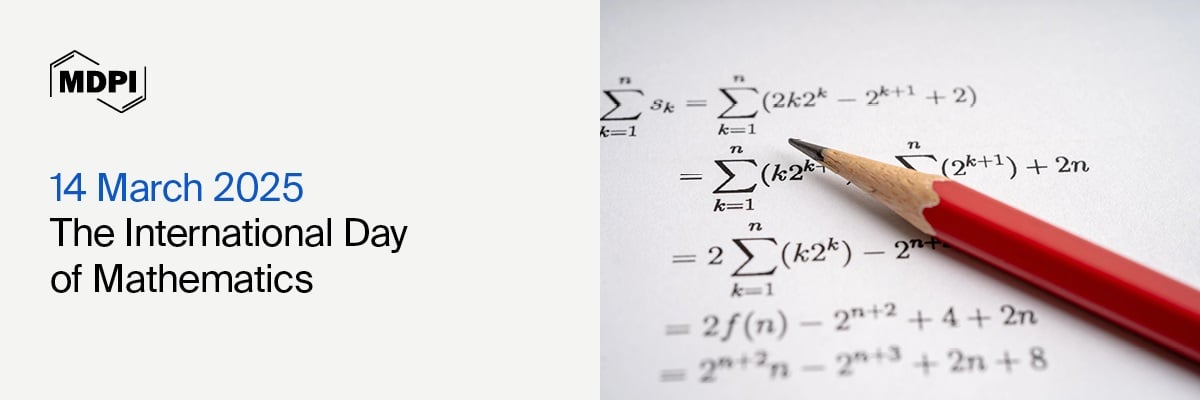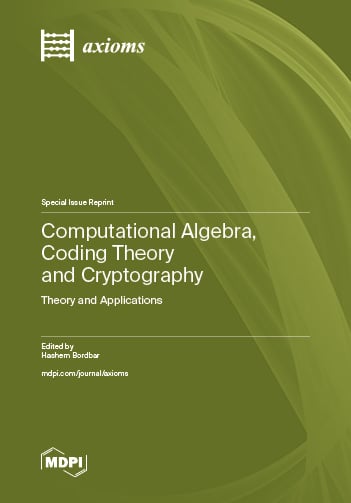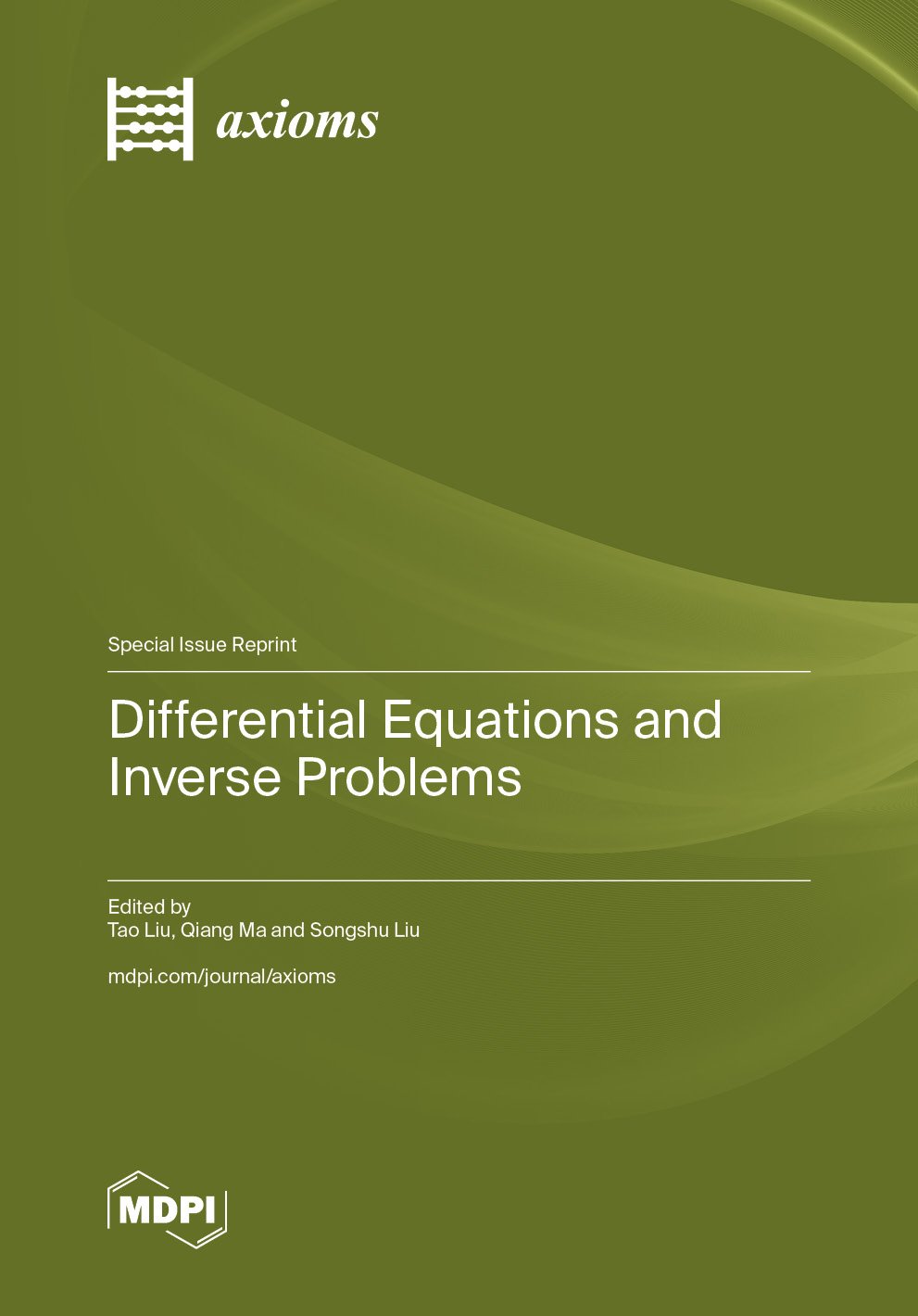Announcements
14 March 2025
International Day of Mathematics—“Mathematics, Art, and Creativity”, 14 March 2025

You are accessing a machine-readable page. In order to be human-readable, please install an RSS reader.
All articles published by MDPI are made immediately available worldwide under an open access license. No special permission is required to reuse all or part of the article published by MDPI, including figures and tables. For articles published under an open access Creative Common CC BY license, any part of the article may be reused without permission provided that the original article is clearly cited. For more information, please refer to https://www.mdpi.com/openaccess.
Feature papers represent the most advanced research with significant potential for high impact in the field. A Feature Paper should be a substantial original Article that involves several techniques or approaches, provides an outlook for future research directions and describes possible research applications.
Feature papers are submitted upon individual invitation or recommendation by the scientific editors and must receive positive feedback from the reviewers.
Editor’s Choice articles are based on recommendations by the scientific editors of MDPI journals from around the world. Editors select a small number of articles recently published in the journal that they believe will be particularly interesting to readers, or important in the respective research area. The aim is to provide a snapshot of some of the most exciting work published in the various research areas of the journal.
Original Submission Date Received: .

With the growing recognition of mathematics as a vital component of artistic expression and innovative thinking, it has now evolved far beyond its traditional role as a problem-solving tool; mathematics serves as a source of inspiration, a bridge between logic and creativity, and a universal language that connects us all. The theme of International Day of Mathematics (IDM) this year is “Mathematics, Art, and Creativity”, with the aim of exploring the interplay between numbers, patterns, and human imagination while bringing awareness to interdisciplinary applications of mathematics.
In recognition of the 2025 International Day of Mathematics, we invite you to explore the captivating interplay between numbers, patterns, and human imagination. As part of this celebration, we examine the progressive role that mathematics plays across disciplines through our upcoming webinars. From the intricate designs of fractals to harmonious proportions in architecture, we will share the inspiring stories of mathematicians, artists, and innovators pushing the boundaries of creativity. Additionally, we have curated a collection of open access research articles that explore this fascinating relationship, freely available to researchers, educators, and enthusiasts worldwide.


| Session 1 | Session 2 |
| Date: 14 March 2025, 07:00 (CET) Webinar ID: 886 5910 5983 Free to register for this webinar here! |
Date: 14 March 2025, 16:00 (CET) Webinar ID: 897 5592 5773 Free to register for this webinar here! |

|
Computer Science & Mathematics |
Biology & Life Sciences
Business & Economics |

“Trigonometric Polynomial Points in the Plane of a Triangle”
by Clark Kimberling and Peter J. C. Moses
Geometry 2024, 1(1), 27-42; https://doi.org/10.3390/geometry1010005
“Sheaf Cohomology of Rectangular-Matrix Chains to Develop Deep-Machine-Learning Multiple Sequencing”
by Orchidea Maria Lecian
Int. J. Topol. 2024, 1(1), 55-71; https://doi.org/10.3390/ijt1010005
“Evolution of Hybrid Cellular Automata for Density Classification Problem”
by Petre Anghelescu
Symmetry 2024, 16(5), 599; https://doi.org/10.3390/sym16050599
“The Flexible Gumbel Distribution: A New Model for Inference about the Mode”
by Qingyang Liu, Xianzheng Huang and Haiming Zhou
Stats 2024, 7(1), 317-332; https://doi.org/10.3390/stats7010019
“Precision-Driven Product Recommendation Software: Unsupervised Models, Evaluated by GPT-4 LLM for Enhanced Recommender Systems”
by Konstantinos I. Roumeliotis, Nikolaos D. Tselikas and Dimitrios K. Nasiopoulos
Software 2024, 3(1), 62-80; https://doi.org/10.3390/software3010004
“Shrinking the Variance in Experts’ “Classical” Weights Used in Expert Judgment Aggregation”
by Gayan Dharmarathne, Gabriela F. Nane, Andrew Robinson and Anca M. Hanea
Forecasting 2023, 5(3), 522-535; https://doi.org/10.3390/forecast5030029
“Big Data Analytics and Machine Learning in Supply Chain 4.0: A Literature Review”
by Elena Barzizza, Nicolò Biasetton, Riccardo Ceccato and Luigi Salmaso
Stats 2023, 6(2), 596-616; https://doi.org/10.3390/stats6020038
“An Agile Model-Based Software Engineering Approach Illustrated through the Development of a Health Technology System”
by Moe Huss, Daniel R. Herber and John M. Borky
Software 2023, 2(2), 234-257; https://doi.org/10.3390/software2020011
“Modelling of Tissue Invasion in Epithelial Monolayers”
by Faris Saad Alsubaie, Hamid Khataee and Zoltan Neufeld
Life 2023, 13(2), 427; https://doi.org/10.3390/life13020427
“Practical Understanding of Cancer Model Identifiability in Clinical Applications”
by Tin Phan, Justin Bennett and Taylor Patten
Life 2023, 13(2), 410; https://doi.org/10.3390/life13020410


 |
 |

